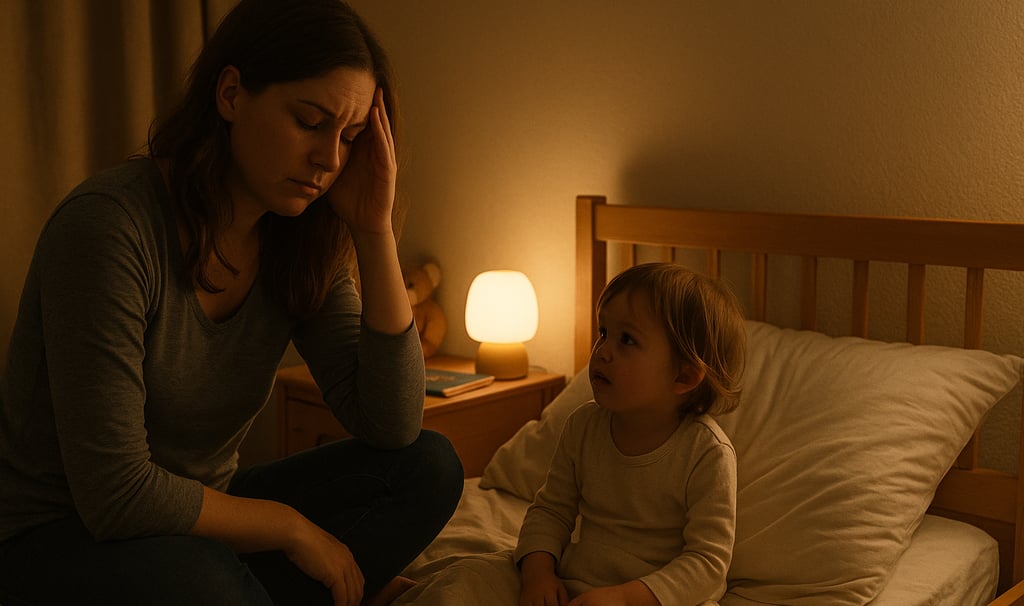7 Mistakes Parents Don’t Realize Are Sabotaging Their Child’s Sleep
Wondering why kids won't sleep? Discover 7 common mistakes parents unknowingly make that can sabotage your child’s sleep—and how to fix them.
SLEEPINFANTSTODDLERS
5/28/20255 min read


If you’ve ever found yourself Googling “why kids won’t sleep” at 2 a.m. while bouncing a wide-awake baby on your hip, know that you’re not alone. As a certified pediatric sleep consultant and a mom who’s been in those trenches, I know firsthand how frustrating it is to feel like you’re doing everything “right” and still ending up with a child who refuses to sleep. The truth? Some of the most common sleep disruptors are things parents don’t even realize they’re doing.
Let’s look at 7 common (and very relatable) mistakes that might be sabotaging your child’s sleep—and how you can gently course-correct to help everyone in your house get more rest.
1. Inconsistent Bedtime Routines
Children thrive on predictability, and sleep is no exception. Without a consistent wind-down routine, their bodies and brains don’t get the signal that it’s time to rest. One night you do bath, book, bed. The next night it’s TV, teeth, and a meltdown. That kind of inconsistency leads to confusion—and a body that’s not ready for sleep when it needs to be.
The fix: Create a simple, repeatable bedtime routine that happens in the same order every night. It doesn’t need to be elaborate. Even 20–30 minutes of calm, predictable steps—like a bath, PJs, story, and snuggles—can signal that sleep is coming. Over time, this rhythm becomes a powerful cue that helps your child’s body wind down.
2. Letting Bedtime Creep Too Late
It’s easy to push bedtime back in hopes your child will be “more tired” and fall asleep faster. But that often backfires. When kids go to bed overtired, their bodies release stress hormones like cortisol and adrenaline that make it even harder to fall (and stay) asleep. That’s a huge reason why kids won’t sleep even when they seem exhausted.
The fix: Know your child’s ideal wake window and bedtime based on their age. For many young children, that sweet spot is earlier than we think—between 6:30 and 8:00 p.m. If you notice crankiness, hyperactivity, or meltdowns in the evening, it’s probably time to move bedtime earlier.
3. Not Prioritizing Daytime Sleep (or Naps That Are Too Late)
There’s a popular myth that skipping naps will make kids sleep better at night. Unfortunately, that’s not how sleep works. Daytime sleep is crucial for night sleep, especially in babies and toddlers. On the flip side, naps that run too late in the afternoon can cause bedtime resistance and night wakings.
The fix: Stick to a regular nap schedule based on your child’s age and make sure naps don’t stretch too far into the evening. For toddlers, the nap should typically end by around 3:00 p.m. If your child is transitioning away from naps, consider offering quiet rest time to take the edge off without interfering with bedtime.
4. Using Screens Right Before Bed
It’s tempting to rely on screens to wind kids down, especially after a long day. But the blue light from tablets, phones, and TVs suppresses melatonin (the sleepy hormone), making it harder for children to fall asleep. Screen time before bed is one of the sneakiest reasons why kids won’t sleep, even if they seem relaxed.
The fix: Turn off screens at least an hour before bed. Swap them out for calm, screen-free activities like puzzles, books, drawing, or even building with blocks. If you need help transitioning away from screens, start small—try reducing screen exposure by just 10–15 minutes a night until it becomes part of your new routine.
5. Responding Inconsistently During Night Wakings
When your child wakes in the night and sometimes gets rocked, sometimes gets brought to your bed, and other times gets told to go back to sleep, they’re left wondering what the “rules” are. Inconsistency in how we respond can create anxiety, confusion, and even more frequent wakings—because they’re not sure what to expect.
The fix: Decide what your ideal response to night wakings is (based on your child’s age and your sleep goals), and stick to it. That doesn’t mean ignoring your child’s needs—but it does mean creating a consistent response so they feel secure and know what to expect each time they wake.
6. Skipping Independent Sleep Skills
Many parents assume kids will naturally learn to fall asleep on their own eventually—but the reality is, some kids need a little coaching. If your child always needs to be rocked, fed, or laid with until they’re asleep, they may struggle to link sleep cycles on their own during the night. That leads to more wakings—and more tired parents.
The fix: Begin gently encouraging more independence at bedtime. This doesn’t mean leaving your child alone to cry—it can be done gradually and lovingly. Try putting them down calm but awake, offering verbal reassurance, or staying nearby while they learn this new skill. Helping your child build confidence in falling asleep solo is often the turning point in solving why kids won’t sleep through the night.
7. Not Realizing Sleep Struggles Might Be Developmental
Sometimes, sleep issues come out of nowhere. One week, your child is sleeping beautifully, and the next, they’re waking up every two hours or suddenly refusing naps. Before you blame yourself, take a breath: this might be a normal part of their growth. Sleep regressions, teething, learning new skills, and big life changes (like starting daycare or a new sibling arriving) can all disrupt sleep temporarily.
The fix: Stay consistent, offer comfort, and remember that these phases pass. It’s still important to hold your boundaries around sleep (as much as possible), but give yourself grace too. If your routines are solid and your child is otherwise healthy, there’s a good chance the rough patch will ease within a few weeks. And if it doesn’t? That’s a sign it might be time to call in support.
Final Thoughts: You’re Not Messing It All Up
Parenting is a learning curve, and sleep doesn’t always follow a straight line. If you see yourself in any of these mistakes, don’t beat yourself up. I’ve made them too—yes, even as a sleep consultant! The important thing is recognizing what might be going on behind the scenes and taking small steps to get back on track.
When families come to me asking why kids won’t sleep, the answer is almost always layered. Sometimes it’s developmental. Sometimes it’s schedule-related. Sometimes it’s just that we’re all exhausted and doing our best. The good news? With a little troubleshooting and support, restful nights are absolutely possible.
If you’re feeling stuck, overwhelmed, or just too tired to figure it out alone, I’m here to help. My sleep plans are personalized, virtual, and designed to work with your family’s values—not against them.
Let’s get your child sleeping soundly… and give you your nights back.
Quick Recap:
The 7 Mistakes That Might Be Sabotaging Sleep:
Inconsistent bedtime routines
Letting bedtime get too late
Ignoring the importance of daytime sleep
Allowing screen time too close to bed
Inconsistent responses to night wakings
Skipping independent sleep coaching
Missing signs of developmental regressions
If this post helped shed light on why kids won't sleep in your house, share it with a tired friend or pin it for later—because good sleep shouldn’t be a mystery.


